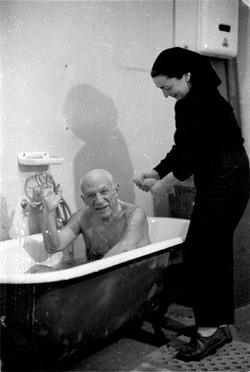This Is Love & It’s Not Pretty Or Romantic.

{source}
I sprinkle Comet on a damp blue sponge and scrub the scuff marks off the worn linoleum floor. It will never be truly clean again.
Once nearly white, it is old now, yellowed, stained and faded. My grandmother kept it spotlessly clean while she was alive, but yesterday, during the estate sale, the feet of the hundreds of people who traipsed through her kitchen left it grimy.
The bleach stings my knees and I slip and slide as I scrub. The grime lifts and disappears. It’s a hot day and I drip with sweat. The house is silent around me, quiet as a grave.
All her things are gone except for a few unwanted pieces of furniture: the matching 1960s dining room table and curio cabinet, an ancient ivory sofa with lion-claw feet, and a pink club chair that always sat in her bedroom. All the things that made this place her home for 75 years have vanished quietly, one at time, leaving with strangers.
As I scrub, I remember how my brother and I used to joke about her immaculate white carpet, the eighth wonder of the world. Well into her 90s, when I called my grandmother on a Saturday, she reported that she just moved the sofa back into place after vacuuming beneath it. I have never vacuumed beneath my sofa. She did so on a weekly basis.
She would hate how dirty her kitchen floor looks now. And she would have hated the estate sale, all those people wandering through her house, critiquing her things. People with tattoos and ripped jeans and dirty shoes. People with bad manners.
During the sale, I wandered among them and held myself back from explaining the significance of each item: “This porcelain horse with the broken leg sat next to my bed in the attic. I gave her that book for her 99th birthday. We used to watch college basketball on that TV. My grandfather died in that chair.”
They looked at her things and saw stuff. Junk. I looked and saw my whole life.
With all the furniture gone, I see how the house has become a little shabby. The immaculate white carpet is not so immaculate after all. Cracks cross the ceiling in most rooms. The basement seems gloomy without my grandfather’s collection of baseball caps and my grandmother’s gardening tools to give the space meaning.
I know prospective buyers will judge it for its flaws, for the yellow and green shag carpeting in the attic bedroom and the old-fashioned kitchen countertops installed in the 1960s. They will judge it by this old linoleum, so I scrub harder.
My grandmother was old-fashioned in every way imaginable. She went to church every Sunday. She never owned a cell phone or a DVD player. She traveled a little, but preferred being close to home, near her garden and her flowers and her friends.
Most of my life I rebelled against the life she would have preferred for me. I never married. I sought graduate degrees instead of settling down. I strayed all over the country and the world. I got tattoos and wore ripped jeans. I called myself spiritual, not religious. I have never scrubbed my own kitchen floor this way.
Here, on my hands and needs, this sponge and bucket are the altar and this is my prayer: Thank You. Thank You. Thankyouthankyouthankyou. Thank you for giving me a foundation of bedrock on which to build my life.
I am here on a hot, sunny Saturday in May, when I have a million other things to do in my busy and full life, because this is love, the only way I have left to give it back to her.
My grandmother’s love included fresh peaches, regular phone calls, cards at Christmas, birthdays, Valentine’s day, Thanksgiving, Easter, and occasionally Groundhog Day.
Her love meant money for college saved from a pension, an extra dessert made just for me because I don’t like nuts, $20 gas money when I visited, and a glass of cranberry juice before bedtime. Love meant praying for my soul because she wanted me to be in heaven with her someday.
Love meant always believing in me, even when my choices made no sense within the context of her world.
After her heart began to fail, I came to the assisted living center to visit her, feed her, wash her glasses and her dentures. I rubbed her back when it hurt and helped her put on a sweater when she was cold. After she was moved to the hospital and then Hospice in her final days, I held her hand while she died.
My parents and I worked together these past months to clear her house and prepare it for sale. And now these final tasks, this last scrub of the kitchen floor, are all that remain.
This is love. It is not pretty nor romantic nor inspiring. I am here on my knees, and it is dirty and hard. But this is what I have to give. This is my love for her. Here, in the grime, I am blessed and whole.
***
Cynthia Briggs is a professor of counseling, a speaker and consultant, and a writer of fiction and creative non-fiction. She’s the co-editor of Snapdragon: A Journal of Art and Healing. Her memoir and essays have been published in numerous print and on-line journals. She teaches expressive arts and writing in her hometown of Winston-Salem, NC. You could contact her via her website.
***
{Join us on Facebook, Twitter, Instagram & Pinterest}

